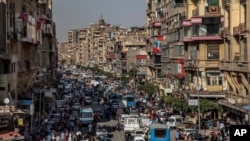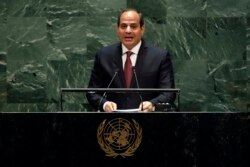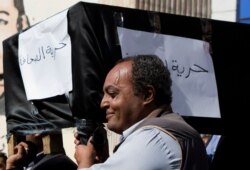Egyptian authorities have ramped up efforts to silence government criticism, issuing orders in recent weeks to restrict media coverage and detain journalists, despite international pressure that’s attracted new attention after a journalist arrested in June died of COVID-19.
Hundreds of journalists, activists, critics, and their relatives have been arbitrarily detained in Egypt since protests in September that called for President Abdel Fattah el-Sissi to step down, according to groups including Amnesty International.
The country’s Supreme Council for Media Regulation last month banned coverage of sensitive political, economic and health issues, including interviews with medical experts about the coronavirus, military operations in Sinai and a dam project in Ethiopia. Media are to use only official government statements.
Any story that contradicts authorities or criticizes the president, his family, or the government’s performance is not tolerated, even in foreign media, according to Ravi R. Prasad, advocacy director at the International Press Institute (IPI). By jailing journalists, Egypt cannot pretend to be a democracy anymore, Prasad said.
The detentions amid the pandemic have led to international criticism and calls for Egypt to release political prisoners, including journalists, for health reasons.
The journalist felled by COVID-19 was Mohamed Monir, who was arrested June 15 on charges of joining a terrorist group and spreading false news. He was released July 2 after contracting the coronavirus and died July 13, an Egyptian journalists’ union said.
The pandemic adds to the weight of journalists whose relatives also have been jailed in retaliation for their work.
Haitham Abu Khalil, a journalist and critic of the government, fled Egypt in 2014 after security raided his organization, the Victims Center for Human Rights in Alexandria. Authorities took Abu Khalil’s brother instead. He was released for a short time before authorities took him back into custody in October, without stating a reason.
“My brother’s health has deteriorated in prison, and I was informed by the families of other detainees that my brother is showing coronavirus symptoms, he is not getting any proper medical care,” Abu Khalil, who is currently living in Turkey, told VOA.
Egypt’s Ministry of Information did not respond to VOA’s request for comment on the arrests.
Earlier this month, the newly appointed heads of the Supreme Council for Media Regulation, the Higher Press Organization, and the Higher Media Organization vowed to work together to stand up to all “negative media practices.”
Minister of Information Osama Heikal said there will be greater cooperation between the state and press, and that they will solve the “problems facing Egypt’s media.”
Ban on criticism
Experts say the harassment of journalists and civil activists appears to be an attempt by authorities to eliminate even the slightest criticism that could turn the public against Sissi and his administration.
“The Egyptian government is paranoid, believing that any form of independent critical journalism will put the government at risk, and that the government fears this might instigate another uprising similar to the uprising of January 2011,” Prasad said, referring to the mass protests that ended the 30-year rule of President Hosni Mubarak.
Sissi came to power in 2013 after the army deposed Egypt’s first democratically elected president, Mohammed Morsi. He has since overseen a large crackdown on dissent.
More than 60 journalists are currently jailed in Egypt, according to the IPI, most on accusations of terrorism-related charges. Often the charge relates to membership of a “banned group” — a reference to the Muslim Brotherhood, Morsi’s party that Egypt labeled a terrorist organization in 2013.
Peter Greste, the UNESCO chair in journalism and communication at the University of Queensland, and a former foreign correspondent with the BBC and Al Jazeera, knows the risks associated with that accusation all too well.
He was arrested in 2013 and imprisoned for over a year on terrorism charges in Egypt with his colleagues, Mohamed Fahmy and Baher Mohamed.
“They alleged that we held secret meetings with the Brotherhood with intent to promote terrorist ideology and destabilize the state of Egypt. We were accused of being members of a terrorist organization, of financing terrorism, of broadcasting false news with intent to destabilize Egypt,” Greste told VOA.
Many foreign journalists started to leave Egypt after the Al Jazeera arrests, because they felt it was impossible to report freely and independently, Greste said.
He and his colleagues were released in 2015 following international pressure, but the journalist said such arrests have a devastating impact on press freedom.
“One of the main lessons of liberal thought is that the best way to find the truth in any situation is to test all opinions with free and open debate,” he said. “Governments who expose themselves to criticism without punishing the critics, tend to make much better policy decisions.”






